Early Anglo-French Cards
Cards produced in Rouen during the sixteenth century. It was cards like these which were imported to England and are the ancestors of the modern 'Anglo-American' pattern.
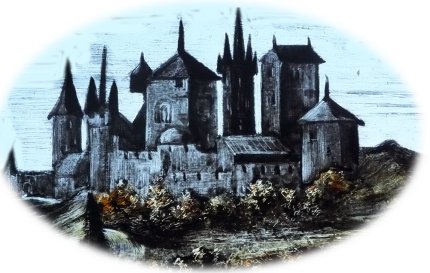
What we now know as ‘French’ suit signs - spades, diamonds, clubs and hearts - is the result of rationalisation of the manufacturing technique during the fifteenth century. Many early or archaic suit systems involved intricate motifs which were more time-consuming to reproduce in woodcuts, hence the French producers invented new ones which could be reproduced with the stroke of a brush over a stencil. The four shapes are easy to recognise - 2 red and 2 black. Some card makers were experimenting with a crescent moon as an alternative symbol, but this didn't catch on. This ‘French’ suit system is now found throughout the world.
Cards shown below were produced in Rouen during the sixteenth century. The cards made in Rouen at that time were an eclectic mixture of features from cards made for various foreign markets, hence the origins of what became the "English" pattern are not one precise source, but a mixture of several earlier regional patterns. It was cards like these which were imported to England and are the ancestors of the modern ‘Anglo-American’ pattern learn more →
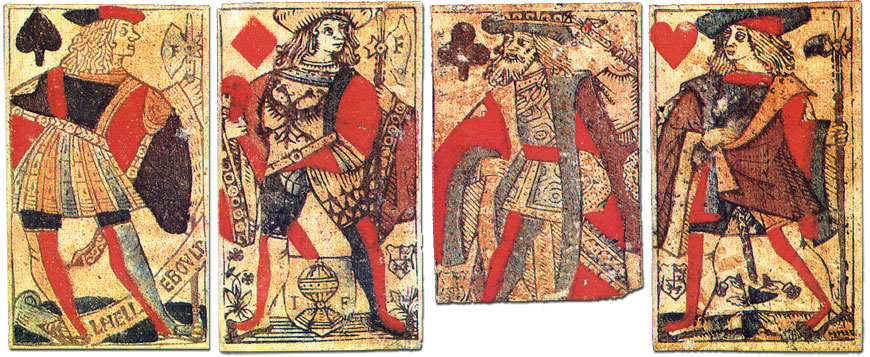
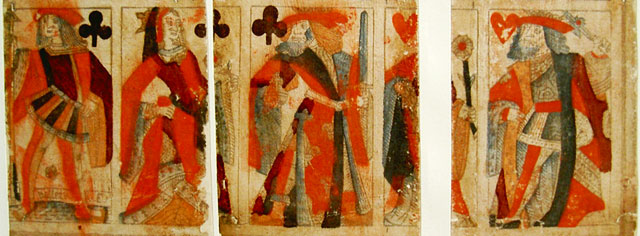

In the hands of English manufacturers the cards gradually became wider, losing their original slimness and liveliness, and the figures became chunky and geometrical. They remained full-length until the nineteenth century when double-ended courts were introduced as another innovation by Victorian manufacturers.
See also: Blanchard • Hunt • Early English Cards • Rick Davidson's Origins Playing Cards►.
By Simon Wintle
Spain • Member since February 01, 1996 • Contact
I am the founder of The World of Playing Cards (est. 1996), a website dedicated to the history, artistry and cultural significance of playing cards and tarot. Over the years I have researched various areas of the subject, acquired and traded collections and contributed as a committee member of the IPCS and graphics editor of The Playing-Card journal. Having lived in Chile, England, Wales, and now Spain, these experiences have shaped my work and passion for playing cards. Amongst my achievements is producing a limited-edition replica of a 17th-century English pack using woodblocks and stencils—a labour of love. Today, the World of Playing Cards is a global collaborative project, with my son Adam serving as the technical driving force behind its development. His innovative efforts have helped shape the site into the thriving hub it is today. You are warmly invited to become a contributor and share your enthusiasm.

Leave a Reply
Your Name
Just nowRelated Articles
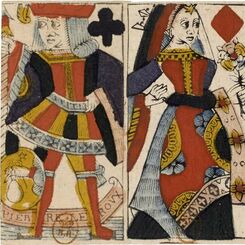
Rouen Pattern - Portrait Rouennais
An attractive XV century French-suited design from Rouen became the standard English & Anglo-America...
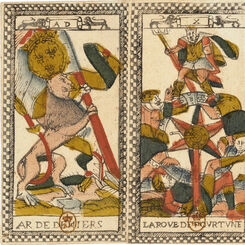
The Parisian Tarot
The “Parisian Tarot”, early 1600s, with imagery and design synthesizing several influences.
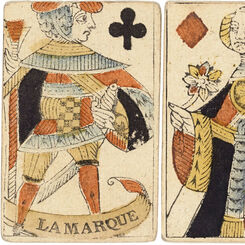
Languedoc pattern - Portrait de Languedoc
The old Languedoc pattern was known at the beginning of the seventeenth century, if not before.
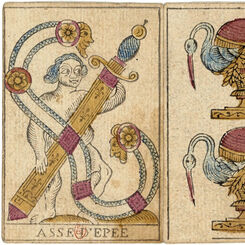
Pierre Roiné Aluette
Archaic form of Aluette published by Pierre Roiné, Nantes, c.1785.
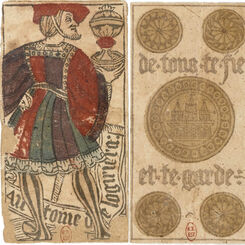
Antoine de Logiriera
Archaic Spanish-suited playing cards published in Toulouse by Antoine de Logiriera (1495-1518).
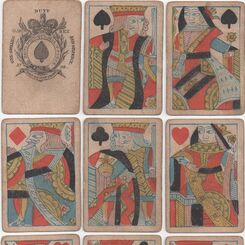
71: Woodblock and stencil: the hearts
A presentation of the main characteristics of the wood-block courts of the heart suit.
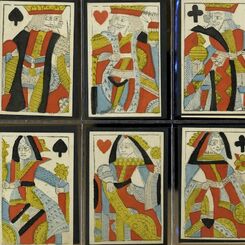
70: Woodblock and stencil : the spade courts
This is a presentation in a more straight forward fashion of the work done by Paul Bostock and me in...
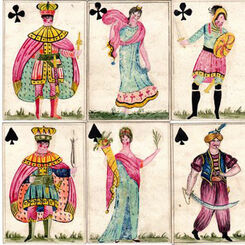
Prisoners of War
Hand-made playing cards by French prisoners of war in Porchester Castle, Hampshire, c.1796.
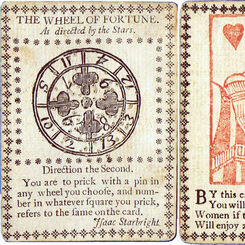
Fortune Telling playing cards
English Fortune Telling cards probably published c.1770.
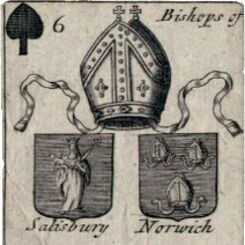
Arms of English Peers
The Arms of English Peers playing cards were first published in 1686. Heraldry, or a knowledge of th...
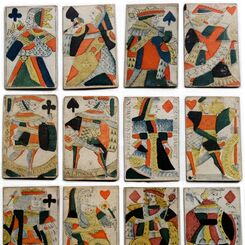
Provence Pattern - Portrait de Provence
The 'Provence' pattern contains figures which go back to the fifteenth century.
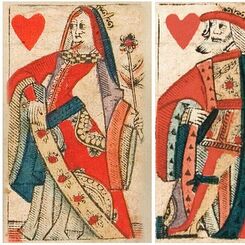
Pierre Marechal
Rouen became an important centre for card-making whose influence extended far afield. Cards from Rou...
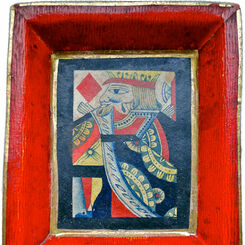
Pope Joan Trays
Some traditional Pope Joan boards comprise a circular tray, others are square, divided into sections...
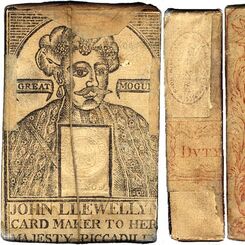
John Llewellyn, playing card manufacturer, London, 1778-1785
John Llewellyn, playing card manufacturer, London, 1778-1785

History of Court Cards
The court cards in English packs of playing cards derive from models produced by Pierre Marechal in ...
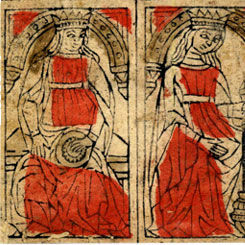
XV Century Italian Playing Cards
Cards from a pack of an early form of north Italian playing cards, with the swords back-to-back and ...
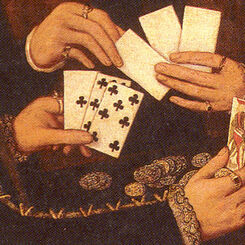
History of English Playing Cards & Games
The History of English Playing Cards dates probably from the mid 15th century
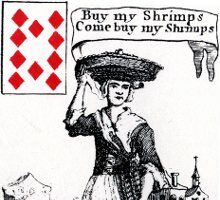
Cries of London
The cards were printed from copper plates, with the red suit symbols being applied later by stencil....
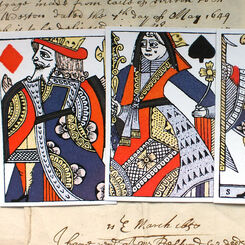
Hewson Replica Pack
Hand-made replica 17th century English playing cards, based on museum originals.

16th Century French Playing Cards based on Illustrations by Gurney Benham
This pack of cards by Rose & Pentagram is said to be based off Pierre Marechal, Rouen pack from the ...
Most Popular
Our top articles from the past 60 days


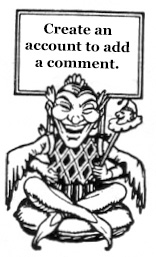 Your comment here. Your comment here. Your comment here. Your comment here. Your comment here. Your comment here. Your comment here. Your comment here. Your comment here. Your comment here. Your comment here. Your comment here. Your comment here. Your comment here. Your comment here. Your comment here. Your comment here. Your comment here. Your comment here. Your comment here. Your comment here. Your comment here. Your comment here. Your comment here. Your comment here. Your comment here. Your comment here. Your comment here. Your comment here. Your comment here. Your comment here. Your comment here.
Your comment here. Your comment here. Your comment here. Your comment here. Your comment here. Your comment here. Your comment here. Your comment here. Your comment here. Your comment here. Your comment here. Your comment here. Your comment here. Your comment here. Your comment here. Your comment here. Your comment here. Your comment here. Your comment here. Your comment here. Your comment here. Your comment here. Your comment here. Your comment here. Your comment here. Your comment here. Your comment here. Your comment here. Your comment here. Your comment here. Your comment here. Your comment here.




















